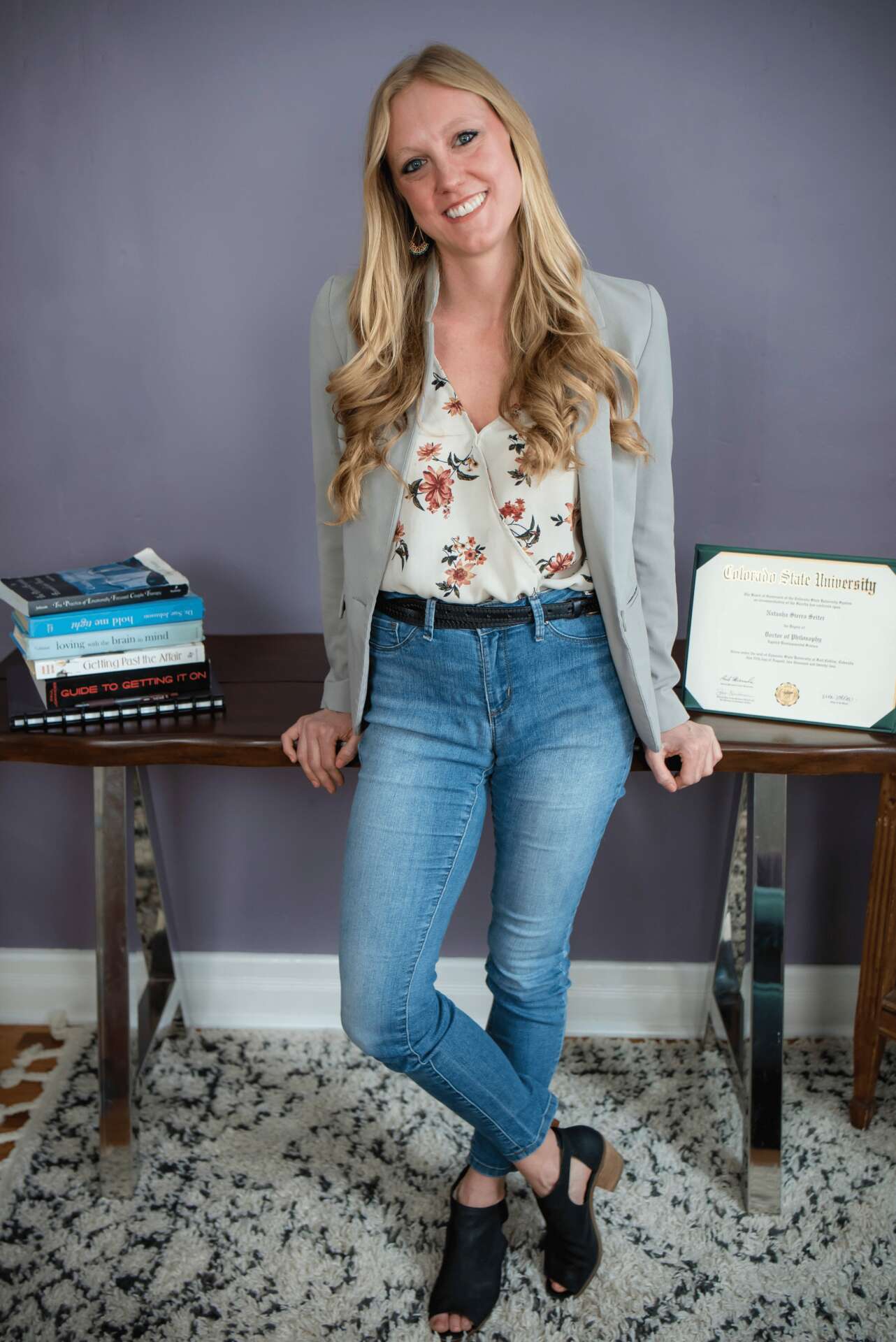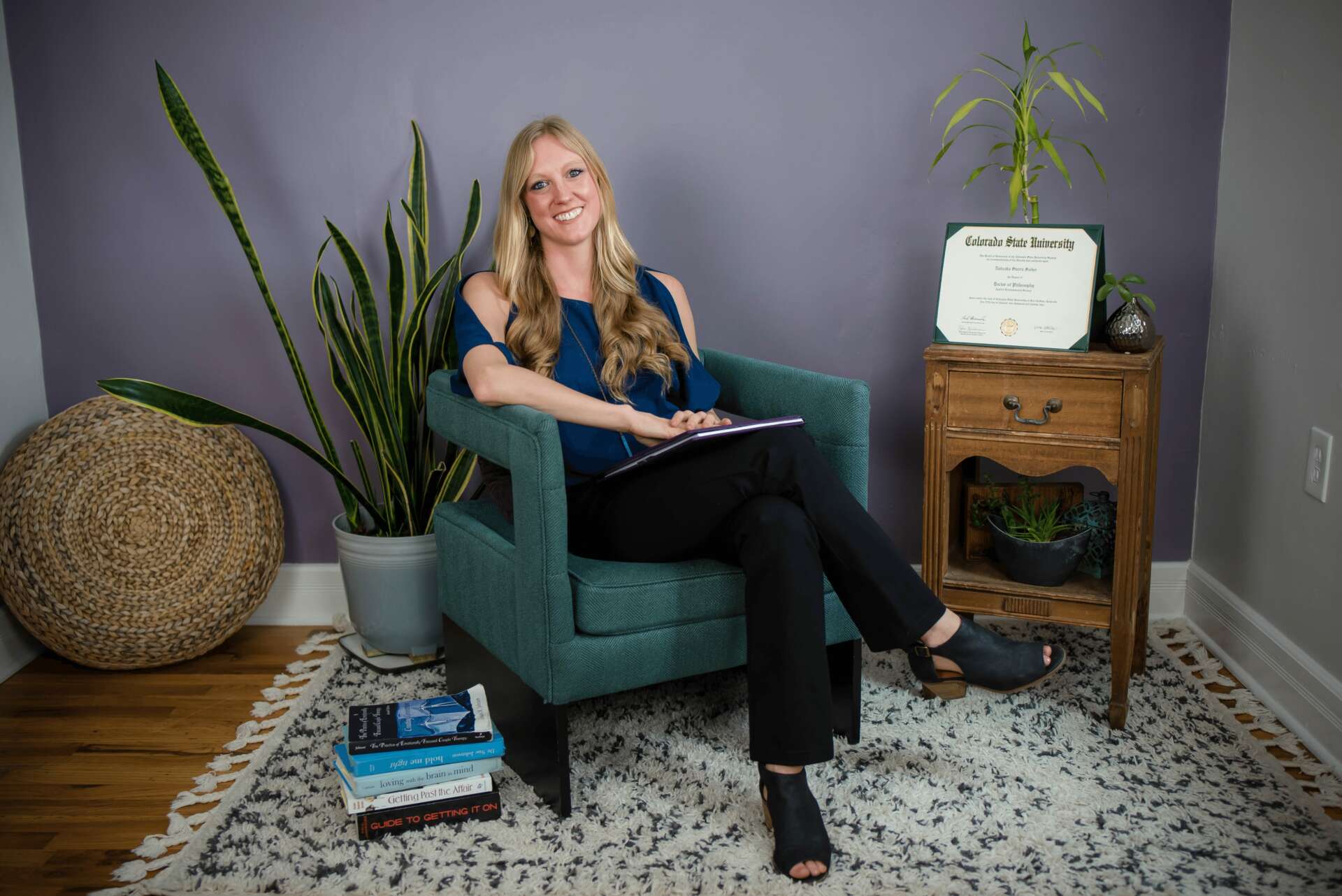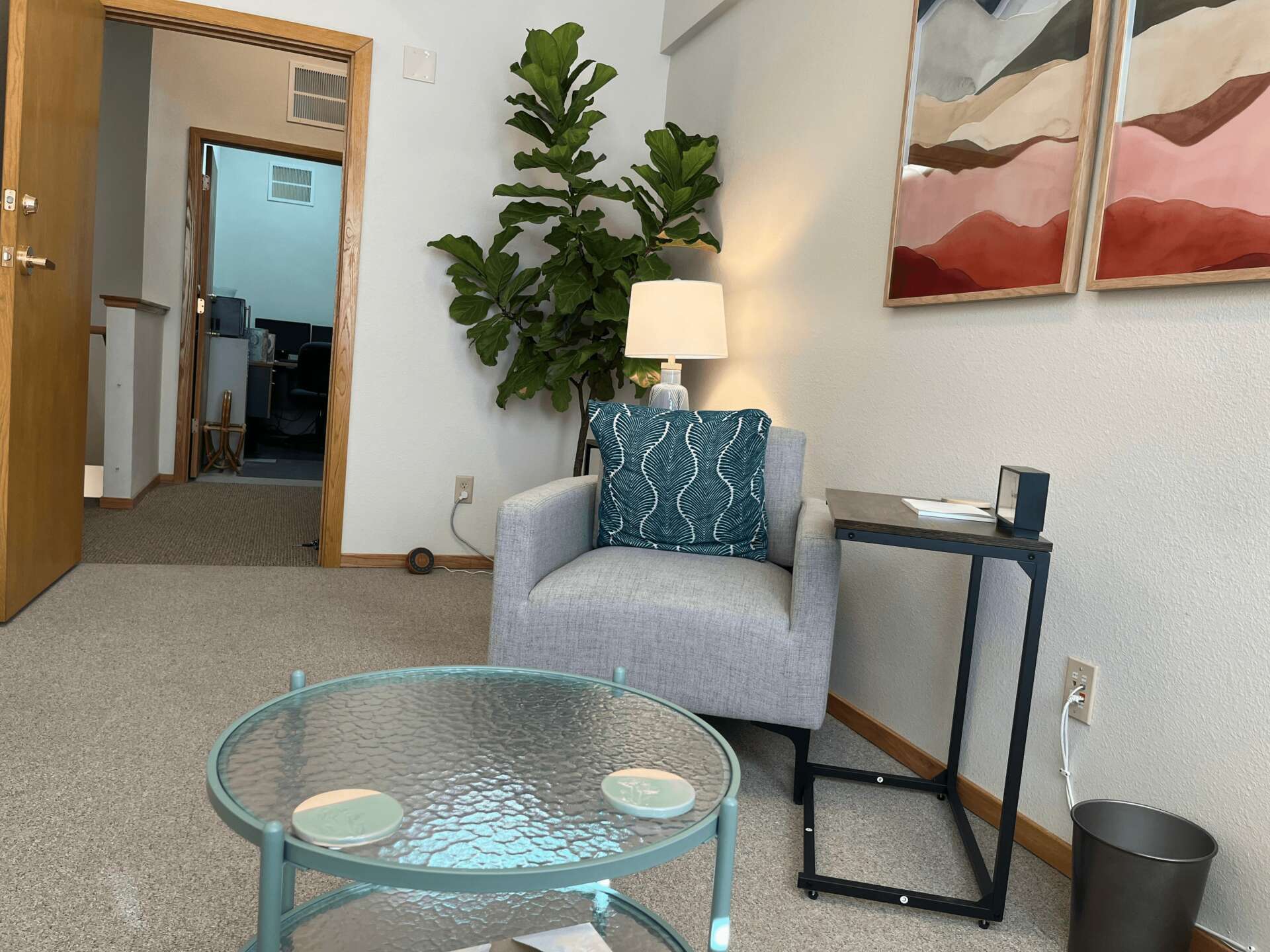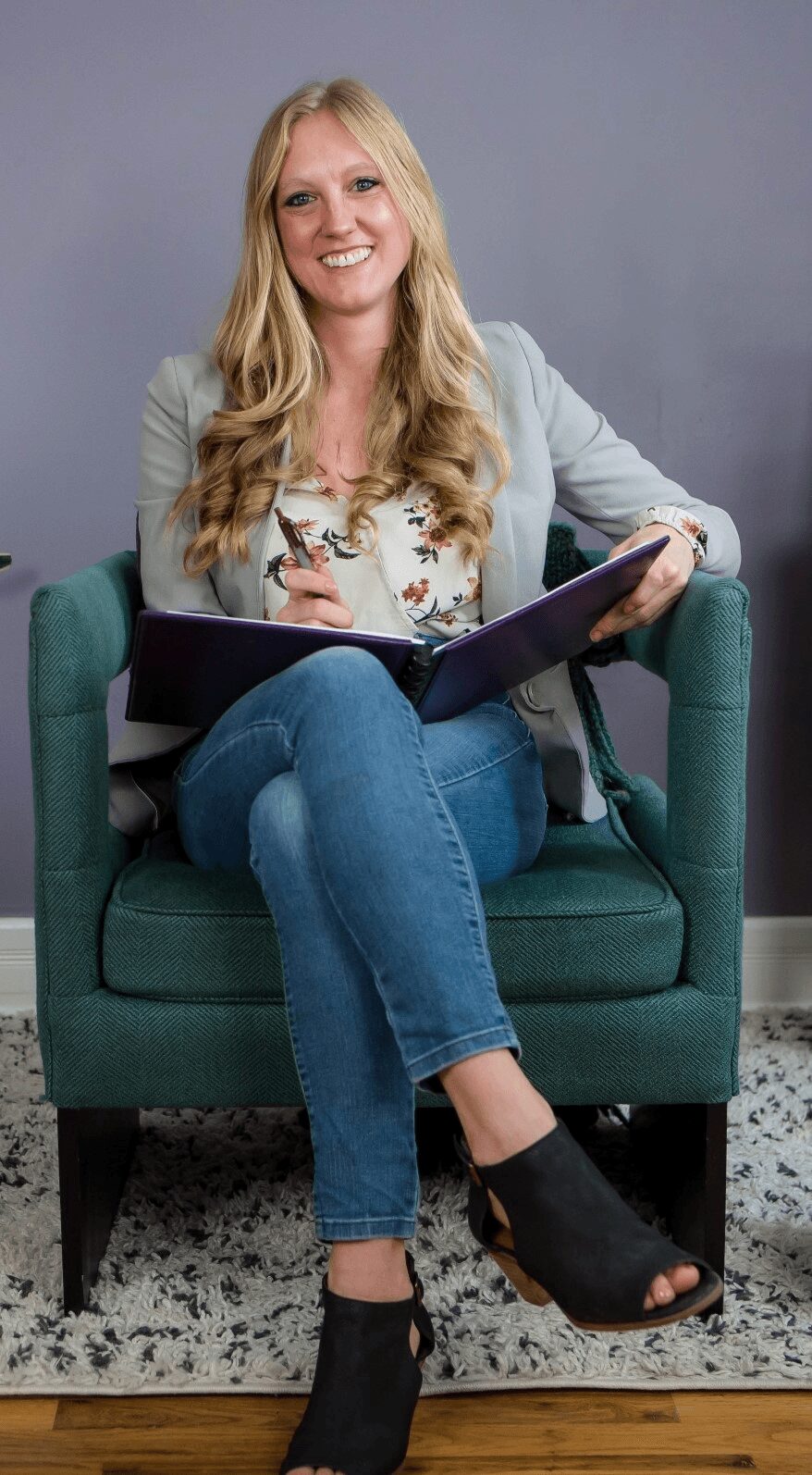We’re excited to introduce you to the always interesting and insightful Tasha Seiter. We hope you’ll enjoy our conversation with Tasha below.
Tasha, thanks for joining us, excited to have you contributing your stories and insights. We’d love to hear about the best advice you’ve ever given to a client? (Please note this response is for education/entertainment purposes only and shouldn’t be construed as advice for the reader)
While it’s hard to say the “best advice,” all of our clients benefit from learning about the most common patterns in relationships and how to break them. These patterns can look a few different ways, but the solution to fixing them is always to learn to communicate in more vulnerable and authentic ways. Here’s an example of what a client will learn throughout the course of couples therapy. Fight, flight, or freeze: these are our stress system’s responses to threat. When being chased by a lion, we will either run (flight), take our shot at defending ourself (fight), or, if our nervous system determines the predator all too dangerous, play dead (freeze).
We don’t see a lot of lions in the settings of our daily lives, but the nervous system is still very concerned with our survival; and our nervous systems believe that our relationships are life or death. We’ve evolved to be social creatures because being a part of a tribe ensured our survival- access to others who cared about us and looked out for us kept us alive and reproducing, while being cast out of the pack was a sure way not to see your next meal. Closeness and connection are safe, distance and isolation are dangerous.
It’s no wonder that when our nervous systems perceive a threat to our connection with others, we experience fight/flight/freeze responses. And a sink full of dishes can register within the nervous system as a signal that our feelings are not considered and prioritized by our partner, causing a panic akin to a threat to survival, “No one has my back; I’m vulnerable to danger. I’m not safe.”
Because of this hard-wired system, there are three common types of patterns that relationships fall into.
1. Pursue/withdraw
When stuck in a pursue/withdraw pattern, one partner criticizes or demands (fight response), whereas the other partner shuts down, hides, or appeases (flight/freeze response). There is conflict, pain, and disconnection. The pursuing partner longs for closeness and to feel loved and cared about, but expresses these feelings in ways that send the message “You aren’t loving me right!” This causes the withdrawing partner to feel inadequate and that they are disappointing their partner, which results in the action of shutting down; they lose confidence that they are capable of being a good enough partner and feel shame that makes them want to hide. When they withdraw, the pursuing partner feels even more alone and becomes even more critical or demanding; and therefore the cycle becomes more and more entrenched.
2. Withdraw/withdraw
In a pattern of mutual withdrawal, both partners tend to avoid tough conversations (fight/flee responses), leaving both partners with unmet needs in the relationship. Rather than fighting, these partners tend to feel that something is missing in their relationship- a sense of emotional intimacy and closeness. They feel more like roommates than partners. Underneath withdrawing behavior is a fear of not being loved, accepted, and responded to. Those who tend to withdraw often grew up in a home where they were shamed or punished for their feelings and having needs of their own, and thus they tend to become hyper-independent rather than sharing feelings and asking others for their needs to be met. They may think something like, “What’s the point in sharing how I feel or that I want more closeness; it will only backfire if I do.” A withdraw/withdraw pattern creates a feeling of loneliness in a relationship. This becomes a part of the cycle, because the more alone that partners feel, the more they will withdraw into themselves and away from the relationship; therefore this pattern also snowballs over time in the absence of intervention.
3. Pursue/pursue (i.e., fight/fight)
When both partners get their dukes out, the fight/fight is marked by high levels of anger, demandingness, or criticism from both partners. Most often, this pattern emerges from a pursue/withdraw pattern in which the withdrawer has started to “bite back” rather than shut down. Sick and tired of being steamrolled, the withdrawing partner starts to stand up for themselves against the pursuer’s criticism or demands, often getting defensive. This does not lead to any lasting positive change, however, since feelings and needs are still not being clearly expressed or responded to.
They are three different patterns, but the problems are in essence the same:
1. The brain encodes unmet needs (like the need to feel close/connected or accepted/seen in a positive light) as a threat to our very survival, causing fight, flight, or freeze responses. Thus, these unmet needs are being expressed in indirect and unhelpful ways that make them nearly impossible to be responded to.
2. Since needs are not being responded to, the problem persists- there is no resolution.
3. In fact, unmet needs become even stronger over time as the pattern takes over. The cycle leads to more disconnection, loneliness, and personal shame. And as these feelings get stronger, if they are handled again and again in unhelpful ways, they feed the cycle rather than break it.
How to Break Your Pattern
No matter if you find yourself in a relationship with high conflict or not enough emotional intimacy, the solution to breaking out of the pattern is to:
1. First, work to understand the pattern in which you’re caught. Dive down to the root of your “action tendency”- what you do when your needs aren’t met.
Do you tend to “fight”- get louder, angrier, more demanding, more critical? If so, take a pause to really look inside yourself and ask yourself what you are needing from your partner when you do these things. Likely, you will find that at the core you are wanting more closeness and connection with your partner, and wanting to know that you are cared about, considered, and loved. Recognize that when you become more angry, demanding, or critical, your partner is more likely to feel not good enough and thus shut down or turn away, feeling less confident in their ability to meet your needs.
Or, do you tend to “flight or freeze”- turn away from the relationship, shutting down or avoiding your partner and tough conversations? If this is you, look inward at what feelings are underneath causing you to pull away. If you allow yourself to fully feel it, you may notice a fear of not being good enough or being inadequate in some way, or a fear that you are not worthy of voicing your relationship needs and having them be met by someone else. In this fear, what you need is to feel fully loved and accepted for who you are and know that being loved is not conditional or based on your “performance”. It’s important to acknowledge that when you withdraw from your partner or the relationship, your partner is likely to feel more alone and long for closeness with you, which may show up as them demanding your consideration or attention.
2. How can you express your needs in a more authentic, vulnerable, direct way that is true to yourself and makes your needs more clear for your partner?
If you tend to be the pursuer, this might sound like, “I know that I’ve been getting on you a lot about the dishes lately. What I think I’m really needing is to know that you care about me and consider how I might feel. If you’d be able to stay on top of the cleaning, it would make me feel really cared about and considered.”
If you’re the one who tends to withdraw, this might sound like, “I’ve been reflecting on how I have been shutting down in our conversations when you bring up the dishes in the sink. I think it’s because when you bring it up I feel inadequate as a partner, and I freeze. Would you be able to bring it up in a more gentle way that makes it easier for me to feel capable and motivated?”
Cycles feed cycles. The stronger a pattern becomes, the more it fuels the unmet needs that fuel fight, flight, or freeze, fueling the pattern. The pattern won’t break itself; the cold hard truth is that if you don’t take intentional action, it will become more entrenched over time.
Don’t let this happen. The good news is, when you learn to get clear on your underlying feelings and unmet needs, along with sharing in a gentle and clear way, you will break the cycle and experience the close, connected, and life-enhancing relationship you have been longing for. It’s time to fight the pattern, not fight your partner.


As always, we appreciate you sharing your insights and we’ve got a few more questions for you, but before we get to all of that can you take a minute to introduce yourself and give our readers some of your back background and context?
I’ve been curious about psychology and relationships since I was a child, and knew I wanted to be a therapist from the age of 15. I’m an identical twin, and at that age, my grandfather gave me a book about twins who were separated at birth. The twins had all sorts of similarities even having grown up in vastly different homes. I became hungry to learn as much as I could about psychology: who we are, how we develop, what helps us thrive. This curiosity combined with growing up in a family of helpers (my dad a nurse practitioner and my mom a social worker) led me to becoming a therapist. On a camping trip at the age of 19, I read John Gottman’s research by the light of a headlamp. He studied newlywed couples- videotaping their interactions. And he could predict with 90% accuracy who would divorce by looking at those tapes! I wanted to know how I could help others have better relationships. From my readings and my own life experiences, as well as watching the lives of those around me, it became clear to me that good relationships meant a good life.
I became a little obsessed with learning everything I could about people and relationships. In college, I majored in human biology and psychology. I wanted to understand everything I could about how people work. After college, I worked in a psychology lab videotaping young couples and studying their communication behaviors. As I watched the videos, I longed to learn more about how I could directly help them find safety, comfort, and joy in their relationships.
I went to graduate school here at CSU, getting my MS in Marriage and Family Therapy and my PhD in Applied Developmental Science, in the department of Human Development and Family Studies. It was there that I started to work with couples and found out just how much I loved it. My research focused on how couple communication affects stress physiology, with my dissertation work surrounding interpersonal mindfulness in couples and its relationship with physiological reactivity to marital conflict, physical health, and cellular aging.
Although I loved the graduate program I attended, including the faculty I worked with, the students, and the freedom to pursue my intellectual interests, I couldn’t wait to get out of school to start my own business and work for myself. While finishing my PhD, I started my private practice as a couples therapist. On a mission to be as helpful as I could to my clients, I threw myself into learning everything I could about the most effective and evidence-based couples therapy methods, including Gottman Method Couples Therapy and Emotionally Focused Couples Therapy (EFT).
This hard work has started to pay off in unexpected, and beautiful, ways. Last spring, a couple of years into private practice, I had a waitlist of 50 people. This showed me just how much our community needs highly trained and specialized relationship specialists, so I decided to start a group practice. First I hired Ann, another highly trained EFT therapist and wonderful person. After her caseload filled up, I found another amazing therapist to add to the team. And then another, and then another. Now, I have five other couple’s therapists on my team. Our practice, Heart of the Matter Therapy, specializes in science-backed and compassionate therapy methods for couples. My mission as a business owner is to keep building a practice of highly skilled and trained relationship therapy specialists and to provide healthy, rewarding careers for my team. I want to give back to our therapists who work hard every day for their clients.
At Heart of the Matter Therapy and Coaching, we are a team of highly-trained relationship therapy specialists who practice science-backed and compassionate methods of couples therapy. With advanced training in the most evidence-based methods, including Emotionally Focused Couples Therapy (EFT) and Gottman Method Couples Therapy, we use the most effective methods in our practice to move couples toward secure, joyful relationships. We help couples find a way out of the patterns that they’re stuck in by learning how to communicate in more authentic and vulnerable ways. After therapy, clients have a deeper understanding of one another, have less arguments, more emotional intimacy, and more fun together. New ways of communicating restructure the very foundation of relationships and change our clients lives! We offer couples, individual, and family therapy in Fort Collins and online throughout the state.

Putting training and knowledge aside, what else do you think really matters in terms of succeeding in your field?
Somebody could have all of the couples therapy training and knowledge in the world, but if they don’t have a genuine care for their clients, they won’t last long in this field. We do this work because we are devoted to our purpose of helping others have better relationships. The feelings of compassion that we feel for our clients every day are very real, and help us connect with our clients as fellow humans.
Learning and unlearning are both critical parts of growth – can you share a story of a time when you had to unlearn a lesson?
One lesson I had to learn as an entrepreneur is that it’s ok to ask for help. I could not have created what I have without the help of so many on this journey. Just to name a few, are close friends who helped me decorate our office spaces, assemble furniture, move, the list goes on and on. I am forever grateful for the ways that my friends and family have shown up in both instrumental and more emotionally supportive ways.
Contact Info:
- Website: https://marriagecounselingfortcollins.com/
- Instagram: https://www.instagram.com/dr.tasha.relationship.therapy
- Facebook: https://www.facebook.com/tashaseitertherapy
- Linkedin: linkedin.com/in/drtashaseiter
- Twitter: https://twitter.com/TherapyTasha
- Youtube: https://www.youtube.com/@dr.tasha.relationship.therapy
- Yelp: https://www.yelp.com/biz/dr-tasha-seiter-ms-phd-lmft-fort-collins
Image Credits
Janel at Soulful Images in Fort Collins took my headshots.


